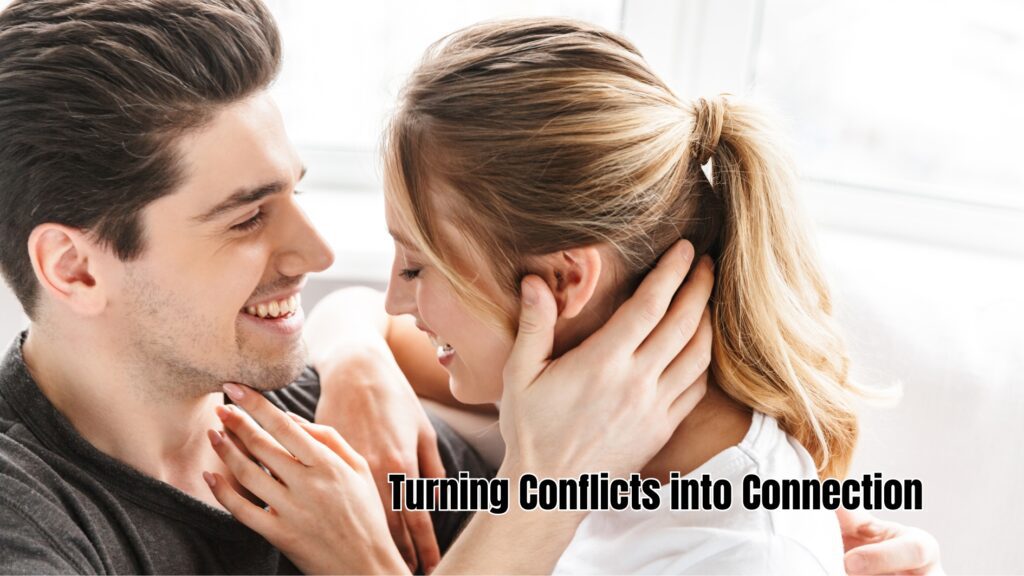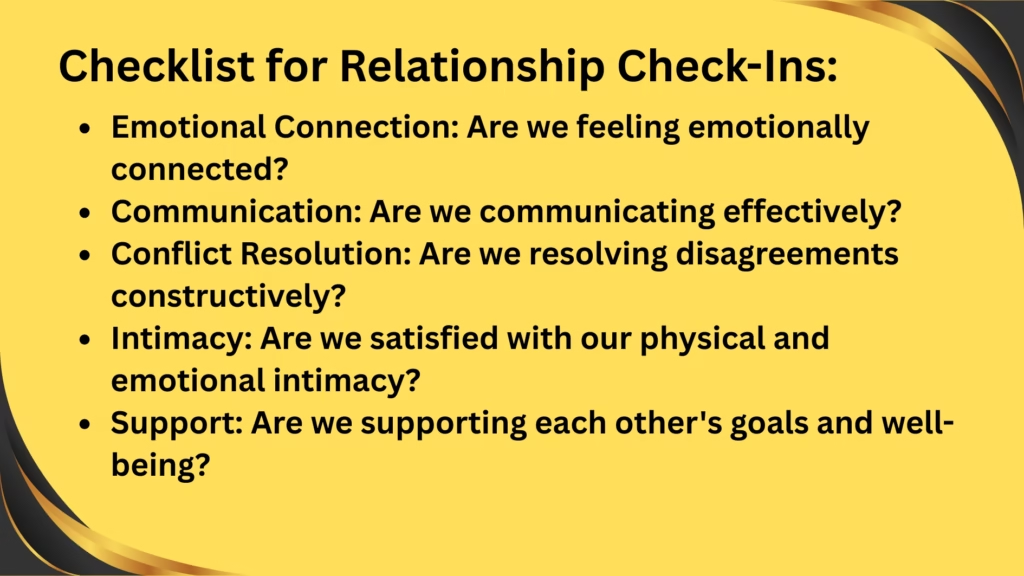Navigating relationship conflicts is a necessary component of any partnership, but how we respond to these conflicts can either make our relationship stronger or weaker. Effective conflict resolution techniques can help couples turn disagreements into chances for development and greater comprehension.

1. Embrace Mindfulness for Constructive Dialogue
Being mindful—that is, present and nonjudgmental—is essential to how couples resolve disputes. Effective conflict resolution techniques and relationship quality are positively correlated with mindfulness, according to a study published in the National Center for Biotechnology Information.
Practical Application:
-
Active Listening: Focus entirely on your partner’s words without planning your response simultaneously.
-
Pause Before Reacting: Take a moment to breathe and consider your response, preventing impulsive reactions.
-
Non-Judgmental Attitude: Accept your partner’s feelings and perspectives without immediate criticism.
Real-Life Example:
Consider a couple, Alex and Jamie, who often argued about household chores. By practicing mindfulness, Alex learned to listen without interrupting, leading to a more empathetic understanding of Jamie’s concerns.
2. Apply the Gottman Method: Avoid the “Four Horsemen”
Dr. John Gottman’s research identifies four negative communication patterns—Criticism, Contempt, Defensiveness, and Stonewalling—that predict relationship breakdowns.
Strategies to Counteract:
-
Criticism → Gentle Start-Up: Use “I” statements to express feelings without blaming.
-
Contempt → Build Appreciation: Regularly express gratitude and respect.
-
Defensiveness → Take Responsibility: Acknowledge your role in the conflict.
-
Stonewalling → Self-Soothing: Take breaks to calm down before resuming the discussion.
Case Study:
In therapy, a couple learned to replace contemptuous remarks with appreciation, leading to a significant improvement in their communication and overall satisfaction.
3. Foster Empathy Through Perspective-Taking
You can build connection and defuse tension by understanding your partner’s point of view. According to research from The Conversation, violence and aggressiveness can be decreased during arguments by taking a third-party, impartial stance.
Implementation Tips:
-
Role Reversal: Try to articulate your partner’s perspective as if it were your own.
-
Ask Open-Ended Questions: Encourage your partner to share their feelings and thoughts.
-
Validate Emotions: Acknowledge your partner’s feelings, even if you disagree.
Expert Insight:
Psychotherapist Esther Perel emphasizes the importance of curiosity and understanding in managing conflicts, suggesting that empathy can transform disagreements into opportunities for intimacy.
4. Implement Structured Communication Techniques
Clarity and the avoidance of misconceptions are two benefits of structured communication. In a Business Insider article, a couple settled their differences through five-minute PowerPoint arguments in which each partner was given the opportunity to respectfully and artistically express their point of view.
Benefits:
-
Time-Limited Discussions: Prevents conversations from becoming overwhelming.
-
Visual Aids: Helps in articulating points clearly.
-
Equal Opportunity: Ensures both partners have a chance to speak.
Real-Life Application:
By adopting this method, the couple turned potential arguments into collaborative problem-solving sessions, enhancing their understanding and connection.
5. Practice Forgiveness to Heal and Move Forward
In order to get over past hurts and create a strong connection, forgiveness is crucial. Dr. Everett Worthington created the REACH Forgiveness model, which provides a set of guidelines for promoting forgiveness: Remember the hurt, sympathize with the perpetrator, extend forgiveness as a selfless act, make a commitment to do so, and maintain your forgiveness.
Steps to Forgiveness:
-
Recall: Acknowledge the pain without minimizing it.
-
Empathize: Understand the circumstances that led to the offense.
-
Altruistic Gift: Choose to forgive as a gift to your partner.
-
Commit: Make a conscious decision to forgive.
-
Hold: Maintain forgiveness, even when reminded of the hurt.
Research Insight:
A study in ShodhKosh found that forgiveness significantly predicts marital satisfaction, highlighting its importance in relationship dynamics.
6. Schedule Regular Relationship Check-Ins
Regularly assessing your relationship can preempt conflicts and strengthen your bond. Love expert Gemma Nice recommends weekly reviews to discuss positives and areas for improvement.

Practical Tip:
Set aside a specific time each week for these discussions, ensuring a safe and uninterrupted environment.
Comparison Table: Conflict Resolution Techniques
| Technique | Description | Benefits |
|---|---|---|
| Mindfulness | Being present and non-judgmental | Enhances understanding and reduces reactivity |
| Gottman Method | Avoiding destructive communication patterns | Improves relationship satisfaction |
| Perspective-Taking | Viewing conflicts from partner’s viewpoint | Fosters empathy and reduces aggression |
| Structured Communication | Using organized methods like timed discussions | Prevents misunderstandings and promotes clarity |
| Forgiveness (REACH Model) | Process of letting go of resentment | Facilitates healing and strengthens bond |
| Regular Relationship Check-Ins | Scheduled discussions about relationship health | Preempts conflicts and enhances connection |
Final Thoughts
Navigating relationship conflicts peacefully calls for deliberate work, compassion, and clear communication. Couples can turn disagreements into learning opportunities and create a more satisfying and peaceful relationship by adopting these six strategies.
Special Advice for Readers
Keep in mind that handling disagreements is more important than avoiding them. Be open-minded and willing to consider your partner’s point of view when you disagree. Regularly putting these tactics into practice can improve your relationship in long-term ways.
Call to Action
Ready to deepen your connection and master conflict resolution? Explore our comprehensive guide, “Rebuild Your Relationship,” available at www.storedigipro.in. This resource offers practical tools and insights to help you and your partner navigate challenges and strengthen your bond.
1. What is the most effective way to start a difficult conversation with my partner?
Begin with “I” statements to express your feelings without blaming. For example, “I feel overwhelmed when…” instead of “You never…”.
2. How can we prevent small disagreements from escalating?
Address issues promptly, practice active listening, and avoid bringing up past grievances during new conflicts.
3. What if my partner is unwilling to engage in conflict resolution?
Encourage open dialogue by expressing your desire to improve the relationship. Suggest seeking couples therapy if necessary.
4. How often should we have relationship check-ins?
Weekly or bi-weekly check-ins are recommended to maintain open communication and address issues proactively.
5. Can forgiveness be achieved without an apology?
Yes, forgiveness is a personal choice and can be extended even without an apology, focusing on your own healing.
6. What role does empathy play in conflict resolution?
Empathy allows you to understand your partner’s perspective, reducing defensiveness and fostering connection.
7. How can we rebuild trust after a major conflict?
Rebuilding trust involves consistent actions, open communication, and, in some cases, professional guidance.
8. Are there any tools to help us communicate better?
Tools like the REACH Forgiveness model and structured communication techniques can enhance understanding and resolution.en.wikipedia.org
9. What if we have different conflict resolution styles?
Recognize and respect each other’s styles, finding a middle ground that accommodates both partners’ needs.
10. How do we know if we need professional help?
If conflicts are frequent, intense, or unresolved, seeking a therapist can provide strategies and support for improvement.
Useful Articles :-
- Signs of Love Bombing: 7 Red Flags to Spot Manipulative Affection Early
- What Is a Situationship? 7 Unfiltered Truths About Modern Love
- 10 Signs of a Healthy Relationship: What To Look For
- Communication Skills for Couples: 7 Transformative Tips to Strengthen Your Connection
- 7 Powerful Ways to Build Healthy Relationship Boundaries for Lasting Love
- 9 Empowering Steps for Recovering from a Breakup: Heal, Grow, and Thrive
- 7 Powerful Long-Distance Relationship Advice : Tips to Keep the Spark Alive
- Jealousy in Relationships: 7 Powerful Ways to Manage the Green-Eyed Monster
- 5 Insights Into Love Languages in Relationships : Do They Really Work?
- What Does Emotional Safety In Relationships? 7 Biblical Keys to Building Trust and Intimacy